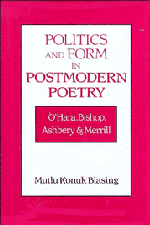Book contents
- Frontmatter
- Contents
- Acknowledgments
- Introduction: Poetry after Modernism
- Frank O'Hara: “How Am I to Become a Legend?”
- Elizabeth Bishop: “Repeat, Repeat, Repeat; Revise, Revise, Revise”
- John Ashbery: “The Epidemic of the Way We Live Now”
- James Merrill: “Sour Windfalls of the Orchard Back of Us”
- Notes
- Works Cited
- Index
- CAMBRIDGE STUDIES IN AMERICAN LITERATURE AND CULTURE
Frank O'Hara: “How Am I to Become a Legend?”
Published online by Cambridge University Press: 12 March 2010
- Frontmatter
- Contents
- Acknowledgments
- Introduction: Poetry after Modernism
- Frank O'Hara: “How Am I to Become a Legend?”
- Elizabeth Bishop: “Repeat, Repeat, Repeat; Revise, Revise, Revise”
- John Ashbery: “The Epidemic of the Way We Live Now”
- James Merrill: “Sour Windfalls of the Orchard Back of Us”
- Notes
- Works Cited
- Index
- CAMBRIDGE STUDIES IN AMERICAN LITERATURE AND CULTURE
Summary
“I don't think of fame or posterity (as Keats so grandly and genuinely did), nor do I care about clarifying experiences for anyone or bettering (other than accidentally) anyone's state or social relation, nor am I for any particular technical development in the American language simply because I find it necessary,” writes Frank O'Hara (1971: 500) in a statement for the New American Poetry in 1959. In 1965, when asked, “You think it's important to be new?” he responds, “No, I think it's very important not to be bored though” (1975b: 9). These two comments could serve as the coordinates for plotting O'Hara's experimentalism. In his writings on painting and poetry he insists on the value of innovative, unconventional, “living and interesting” work (13), not out of any reformist zeal but to forestall boredom. The fear of boredom, a repeated concern throughout his writing, places him in a specific cultural economy, itself geared to the continuous production and consumption of novelty to ward off boredom. O'Hara does not mystify avant-garde art as oppositional but locates its impulse to technical innovation within the cultural and economic mainstream. Experimental art is exciting, he suggests, precisely because it does not oppose but shares the cultural dynamic and responds to the stresses and strains of a specific historical moment.
By 1950, experimental arts belong in the complex of the latecapitalist economy, and such art cannot in good faith claim a morally superior vantage point from which to judge the culture.
- Type
- Chapter
- Information
- Politics and Form in Postmodern PoetryO'Hara, Bishop, Ashbery, and Merrill, pp. 30 - 66Publisher: Cambridge University PressPrint publication year: 1995
- 1
- Cited by

